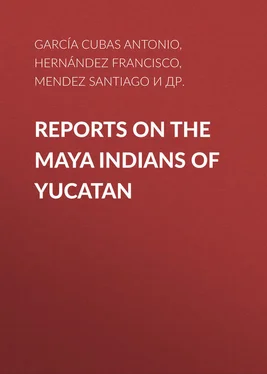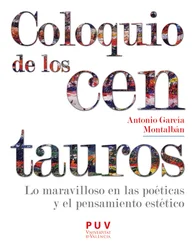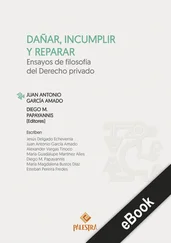Antonio García Cubas - Reports on the Maya Indians of Yucatan
Здесь есть возможность читать онлайн «Antonio García Cubas - Reports on the Maya Indians of Yucatan» — ознакомительный отрывок электронной книги совершенно бесплатно, а после прочтения отрывка купить полную версию. В некоторых случаях можно слушать аудио, скачать через торрент в формате fb2 и присутствует краткое содержание. Жанр: foreign_antique, foreign_prose, на английском языке. Описание произведения, (предисловие) а так же отзывы посетителей доступны на портале библиотеки ЛибКат.
- Название:Reports on the Maya Indians of Yucatan
- Автор:
- Жанр:
- Год:неизвестен
- ISBN:нет данных
- Рейтинг книги:5 / 5. Голосов: 1
-
Избранное:Добавить в избранное
- Отзывы:
-
Ваша оценка:
- 100
- 1
- 2
- 3
- 4
- 5
Reports on the Maya Indians of Yucatan: краткое содержание, описание и аннотация
Предлагаем к чтению аннотацию, описание, краткое содержание или предисловие (зависит от того, что написал сам автор книги «Reports on the Maya Indians of Yucatan»). Если вы не нашли необходимую информацию о книге — напишите в комментариях, мы постараемся отыскать её.
Reports on the Maya Indians of Yucatan — читать онлайн ознакомительный отрывок
Ниже представлен текст книги, разбитый по страницам. Система сохранения места последней прочитанной страницы, позволяет с удобством читать онлайн бесплатно книгу «Reports on the Maya Indians of Yucatan», без необходимости каждый раз заново искать на чём Вы остановились. Поставьте закладку, и сможете в любой момент перейти на страницу, на которой закончили чтение.
Интервал:
Закладка:
Santiago Mendez, Antonio García y Cubas, Pedro Sanchez de Aguilar, Francisco Hernandez
Reports on the Maya Indians of Yucatan
PREFACE
So little has been written in regard to the ethnology of the Maya Indians of Yucatan, and especially concerning their beliefs, which persist to the present time, that we publish here a translation of an important and practically unknown account of this subject. This report was printed in Mexico in 1870, but it is buried in a study by Antonio García y Cubas entitled "Materiales para formar la Estadistica General de la Republica Mexicana," in Boletin de la Sociedad Mexicana de Geografia y Estadistica , segunda epoca, tomo II, pp. 352-388. It is on pages 374-387, bears the date Mérida, October 24, 1861, and was written by Santiago Mendez, who states that he was governor of Yucatan during the years 1841-42. In connection with a study of this report, so far as it relates to the beliefs of the Maya, it will be profitable to consult the paper by Dr Daniel G. Brinton on The Folk-lore of Yucatan, printed in the Folk-Lore Journal , London, vol. I, part viii, 13 pp., August, 1883.
We have also had translated the notes on the superstitions of the Indians of Yucatan contained in the work of Pedro Sanchez de Aguilar, 1639, published by the Museo Nacional of Mexico in 1892 (pp. 83-84), and the report of Francisco Hernandez on the religious beliefs of the Yucatan Indians, which was sent to Bartolomé de las Casas, evidently while Bishop of Yucatan in 1545, and is given by him in chapter cxxiii (pp. 328-330) of his Apologetica Historia de las Indias, a work which did not appear in print until 1875-76, the first complete edition of which was edited by M. Serrano y Sanz, and printed at Madrid in 1909.
The information contained in the Mendez report is strikingly similar to that given by Bartolomé José Granado Baeza on Los Indios de Yucatan, an account written in 1813 but not published until 1845, when it appeared in the Registro Yucateco , tomo I, pp. 165-178. This report of Baeza is one of the principal sources used by Brinton in his study.
The editor has incorporated a few brief notes, and has prepared a glossary of the Indian words and a short bibliography of the subject.
Marshall H. Saville.THE MAYA INDIANS OFYUCATAN IN 1861
Report on the Customs, Labor, Language, Industry, Physiognomy, etc., of the Indians of Yucatan, made by the Agent of the Department of Public Works, who signs this report, in obedience to orders of February 6, 1861.
CUSTOMS
The character of the Indians of Yucatan is such that, were they to be judged only by their customs and their habits, we would have to qualify them as stupid and devoid of reason. It seems indifferent to them to be in the shade or exposed to rain or to the scorching rays of the sun, even though they could avoid it. It does not matter to them whether they go dressed or naked. They never try to obtain commodities they see other races enjoy, even though the trouble or sacrifice it would cost to get them might be but small. In order to rest or to chat with their companions they hardly ever sit down: they squat, it being quite indifferent to them that they do it in a sun that scorches them when they might perhaps have shade two steps from where they are. Reward does not encourage them, nor does punishment admonish them; in the first place, they think they deserve more, – perhaps because they were always accustomed to be made use of, – and in the second case they consider punishment as a kind of fatality from which it is quite useless to try to deliver themselves: hence they do not reform. So long as their hunger is stilled, it is quite indifferent to them whether their meal is exquisite and varied, or whether it consists only of tortillas and chile, devouring their food in either case with astounding voracity. When they find themselves driven by utter necessity, they will work in order to remedy it, but they never do so with zeal or with the desire to improve their fortunes. They are so improvident that they may squander in one day the earnings of a week, in an exaggerated amount of dainties or in superstitious practices, and above all by intoxicating themselves, leaving their families without bread and clothing. Or, they remain idle until whatever they earned by the sweat of their brow is gone. They cultivate a cornfield and gather a good harvest from it, and even though they do not need to do so, they will sell the corn with considerable loss in order to squander the money in splendid repasts and superstitions, both of which always go together. This harvest might insure the subsistence of their family for a whole year, but their improvidence will reduce them within a few days to having to sell themselves for work (peonage).
The love of the parents for their children, of the children for their parents, and between husband and wife, is barely lukewarm, and not at all passionate, if we are to judge from their absolute lack of signs of sympathy, pity, or condolence. They contemplate dry-eyed and rather indifferently the suffering of their nearest, and even their demise, without allowing this to change their demeanor or letting it interfere in the least with their general customs of life.
Although some of them can read and write, they use it very little, either because they are very slow and clumsy in the exercise of both, on account, no doubt, of the lack of practice, and also because there is but little written in their own language.
Their children have usually no other education than that which they receive from the curates, priests, choirmasters, and teachers of the catechism, which education was formerly given to them at the church doors or in the mansions of the large ranches and farms, and they were compelled to assemble every morning from seven to eight to learn the catechism. At the present day, as it is not possible to force the parents to send their children to learn even this, there are but few who learn at all, especially among the boys. When the writer of this was governor of this state in the years 1841 and 1842, he succeeded in establishing primary schools in almost all the villages, and although averse to anything that looks or sounds like despotism, he authorized, nevertheless, the mayors, justices of the peace, and chieftains ( caçiques 1 1 For the meaning of this and of other Indian words, consult the glossary .
) to use it in order to force parents to send their children to the said schools. Unfortunately, in 1842 came the invasion by the forces of general Santa Anna, and in the effort to resist them, all the resources of the state were spent for many years in advance. Then followed our own senseless revolutions and the almost general uprising of these same Indians against the other native races, consequently these schools passed out of existence without it having been possible until this day to reëstablish them. Hence this remains an unsolved problem and it is difficult to calculate the profit they might have brought (once the tenacious and persistent opposition of the Indians overcome), leaving them convinced of the advantages it might mean to further their knowledge even in the manual labor they perform.
Generally they train their children from a very early age to help in their agricultural labor such as their forefathers did before the conquest, or else they teach them light manual labor, such as weaving little mats or matting in general, making small bags, baskets of all kinds and sizes, leather bands such as are used by the native porters, sacks, hammocks, ropes, to prepare henequen from agave fiber, to make straw hats, and so forth. In some villages they are taught to make common pottery, and in places near the coast they are shown how to extract salt, to fish, and seamanship in general. It is very rare that they are taught other arts and crafts or trades, with the exception perhaps in cities or principal towns, where, especially when they have been reared and educated in the households of white people, they may become efficient in the art of quarrying stone, though quite primitively, or they qualify as masons, shoemakers, tailors, muleteers, drivers, and cowboys. They also provide the town with firewood, charcoal, and fodder.
Читать дальшеИнтервал:
Закладка:
Похожие книги на «Reports on the Maya Indians of Yucatan»
Представляем Вашему вниманию похожие книги на «Reports on the Maya Indians of Yucatan» списком для выбора. Мы отобрали схожую по названию и смыслу литературу в надежде предоставить читателям больше вариантов отыскать новые, интересные, ещё непрочитанные произведения.
Обсуждение, отзывы о книге «Reports on the Maya Indians of Yucatan» и просто собственные мнения читателей. Оставьте ваши комментарии, напишите, что Вы думаете о произведении, его смысле или главных героях. Укажите что конкретно понравилось, а что нет, и почему Вы так считаете.












